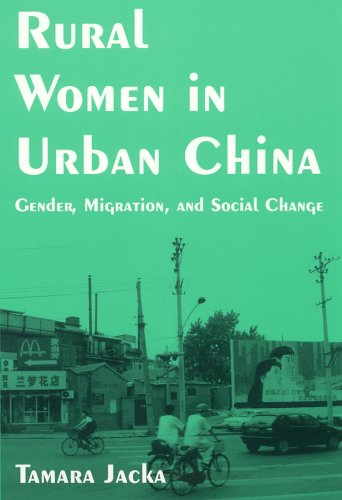

Most ebook files are in PDF format, so you can easily read them using various software such as Foxit Reader or directly on the Google Chrome browser.
Some ebook files are released by publishers in other formats such as .awz, .mobi, .epub, .fb2, etc. You may need to install specific software to read these formats on mobile/PC, such as Calibre.
Please read the tutorial at this link: https://ebookbell.com/faq
We offer FREE conversion to the popular formats you request; however, this may take some time. Therefore, right after payment, please email us, and we will try to provide the service as quickly as possible.
For some exceptional file formats or broken links (if any), please refrain from opening any disputes. Instead, email us first, and we will try to assist within a maximum of 6 hours.
EbookBell Team

4.8
44 reviews
ISBN 10: 0765608215
ISBN 13: 9780765608215
Author: Tamara Jacka
Based on in-depth ethnographic research - and using an approach that seeks to understand how migration is experienced by the migrants themselves - this is a fascinating study of the experiences of women in rural China who joined the vast migration to Beijing and other cities at the end of the twentieth century. It focuses on the experiences of rural-urban migrants, the particular ways in which they talk about those experiences, and how those experiences affect their sense of identity. Through first-hand accounts of actual migrant workers, the author provides valuable insights into how rural women negotiate rural/urban experiences; how they respond to migration and life in the city; and how that experience shapes their world view, values, and relations with others. The book makes a major contribution to our understanding of the relationship between gender and social change, and of the ways in which globalization and modernity are experienced at the most personal level.
Part I The Subject
1 Between “Rural Idiocy” and “Urban Modernity”
Modernity and the Peasant Question Before and After 1949
The “Low Quality” of Peasants in Post-Mao China
The “Tide of Peasant Workers” in Post-Mao Discourse
Conclusion
2 Assembling Working Sisters
Structures and Orientations
The Rural Women Journal
Working Sister
A “Home for Working Sisters”
Conclusion
Part II Place
3 In and Out of Place
What do I get from the household registration system?
Regulation and Surveillance
Employment
Work Hours and Conditions
Housing
Income and Expenditure
Health
Marriage and Children
Conclusion
4 The Place of Desire
The Place Left Behind
Finding a Life
The Place of the Future
Conclusion
Part III People
5 Relationships
Family Relationships
Filial and Rebellious Daughters: Dagongmei Relations with Their Parents
“Associational Migrants”? Relations Between Married Migrant Women and Their Husbands
Relationships with Fellow Villagers and Urbanites
Kinship, Localistic, and Other Migrant Ties
Relations with Urbanites
Conclusion
6 Identifications
Us and Them
Migrants as Nonlocals
Peasants, Outsiders, and In-Betweeners
Laoxiang and Dagongmei
Gender and Individualism
Traits of Difference
Occupation, Wealth, and Education
Dress and Sexuality
Civilization and Quality
“Knowing How to Talk”
Conclusion
Part IV Time
7 Narrative, Time, and Agency
Migration Narratives and the Life Course
Migration as Rural Economic Strategy
Migration as Interlude: Seeing the World and Having a Good Time
Escape
Changing One's Fate
“Eating Bitterness Is a Blessing”: Migration as Initiation and Self-development
Speaking Bitterness and Fighting for Our Rights: Migrant Narratives of Protest
Speaking Bitterness
Human Rights
Conclusion
Appendix 1 List of Interlocutors Named in the Text
Appendix 2 Maps
Notes
Notes to Introduction
Notes to Chapter 1
Notes to Chapter 2
Notes to Chapter 3
Notes to Chapter 4
Notes to Chapter 5
Notes to Chapter 6
Notes to Chapter 7
Glossary
Bibliography
Index
rural women in urban china gender migration and social change
on the move women and rural-to-urban migration in contemporary china
performing identities women in rural urban migration in contemporary china
china rural vs urban population
urban vs rural china
Tags: Tamara Jacka, Rural Women, Urban China, Social Change